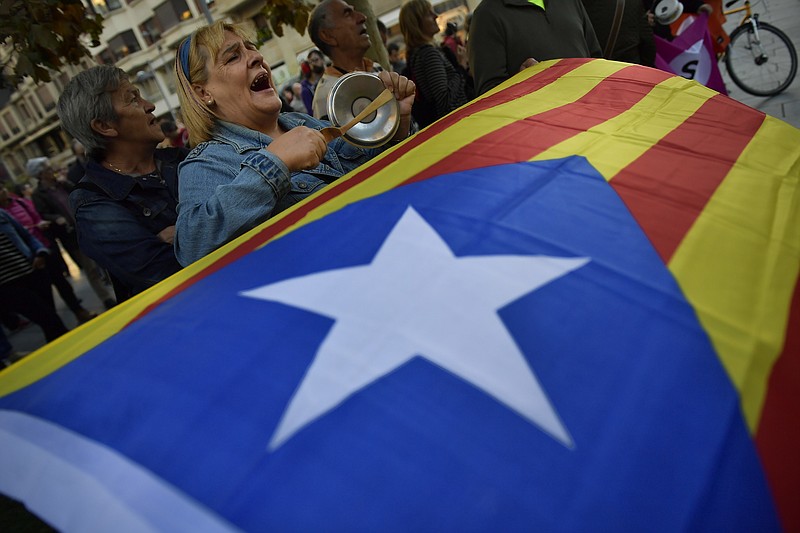BARCELONA, Spain (AP) - As separatists in Catalonia jockeyed Friday to elude court rulings and find ways to deliver on their promise to declare independence, business giants hit back with plans to relocate their headquarters elsewhere in Spain amid the increasing political uncertainty.
Caixabank, Spain's third lender in global assets, said Friday that it was moving from Barcelona to the eastern city of Valencia, "given the current situation in Catalonia." It said it wants to remain in the eurozone and under the supervision of the European Central Bank - two things that would not happen if Catalonia did manage to secede.
The region's separatist government has vowed to use a pro-independence victory in a disputed referendum last weekend to go ahead with secession, while calling for Spain's central government to accept a dialogue.
However, the government of Spain's conservative Prime Minister Mariano Rajoy has rejected any negotiations unless the separatists drop their secession bid. Rajoy urged Puigdemont to cancel plans for declaring independence in order to avoid "greater evils."
"In order to dialogue, you must stay within the legal framework," Spanish cabinet spokesman Inigo Mendez de Vigo told reporters Friday, blaming the secessionists for breaking Spain's constitutional order.
"Coexistence is broken" in Catalonia, he said, warning Catalans a parliamentary declaration of independence "is not enough" and the international community needs to recognize independent nations.
No country has openly said it would support secession, and the European Union said an independent Catalonia would be kicked out of the bloc and forced to stop using the common euro currency. The EU said Catalonia would have to apply to rejoin, a lengthy, uncertain process.
The prospect of an exit has sent shivers among business heavyweights, including lender Banco Sabadell and energy giant Gas Natural, who were among the firms to greenlight relocations of their registered address.
The companies are moving only their official address and so far that does not affect jobs or investments. It doesn't, however, send a message of confidence in the government of Catalan regional President Carles Puigdemont.
Cava-maker Freixenet and Codorniu, two household names in the region's famed sparkling wine, are also considering a move.
Caixabank's relocation was possible after central authorities approved a decree allowing executives to bypass shareholder approval for moving a company's registered address.
"It's very sad what we are seeing," Economy Minister Luis de Guindos said Friday. "This is the result of an irresponsible policy that is causing uneasiness in the business community."
The prospects for an independence declaration remained up in the air after a Constitutional Court suspended a Catalan parliament session next week during which separatist lawmakers wanted to bring up the secession plan.
Puigdemont is now set to address the regional parliament Tuesday "to report on the current political situation" in Catalonia.
Regional opposition parties said Puigdemont will be grilled by lawmakers, without any vote expected. However, a lawmaker with the far-left separatist CUP group said pro-independence parties were working on introducing a last-minute vote to declare independence.
The Catalan government Friday submitted to parliament the final results of the Oct. 1 disputed referendum.
Spain's central authorities have deemed the referendum illegal and a Constitutional Court suspended it. However, the Catalan government has declared a landslide victory for the 'Yes' despite the fact only 43 percent of the region's 5.3 million eligible voters turned out amid strong police pressure to shut down the vote.

